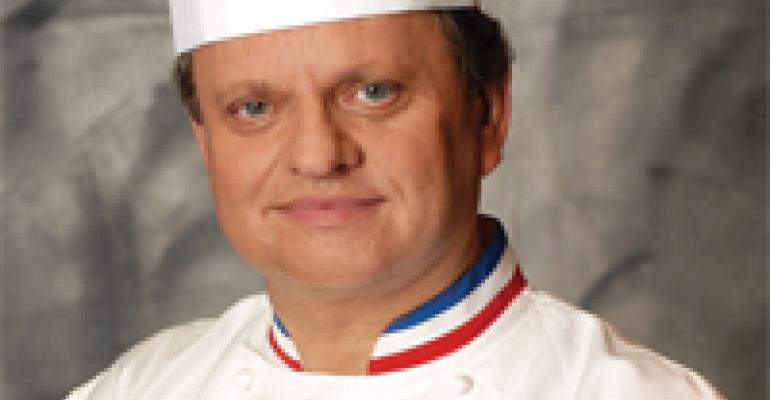
Many in the food world had their doubts when Joel Robuchon opened his place in the MGM Grand in Las Vegas in 2005. They wondered if he would just be phoning it in.
Robuchon had been acknowledged as the “Chef of the Century” when he closed his Paris restaurant in 1996, announcing that at age 50, he was done. But then in 2003 he began to open restaurants at a furious pace. Now he has a dozen, located around the world from Macau to Monaco, each one evidencing the talents that made him so great a decade ago. His eponymous Joel Robuchon is now the only restaurant in Las Vegas to hold three Michelin stars, and his more casual L'Atelier de Joel Robuchon, also in the MGM Grand, is regarded as a premier dining experience, too. Collectively, Robuchon holds 18 Michelin stars; no other chef is close.
He's done it all while serving French food, typically old-school fare brought up-to-date courtesy of Robuchon's sensational technique and progressive outlook. That's the same approach on display in The Complete Robuchon: French Home Cooking For The Way We Live Now (Alfred Knopf; $35). It's French cooking, all right, in the purest sense of the word. As for the “home,” in the title, it would have to be a home where Mom or Dad is eager to whip up Sea Trout With Curried Carrot Tagliatelle or tackle Breast of Young Partridge with Kale and Foie Gras. Which is to say, it's mostly restaurant fare being offered in this book.

But Robuchon isn't kidding about the “complete” part. He gives readers more than 800 recipes, presenting them in a no-frills format so basic you'll quickly understand how his 816-page book can be sold at such a modest price. There are no pictures or drawings, just solid text all the way through. Recipes are arranged by ingredient and each set of them, usually numbering four or five, constitutes a meditation on how Robuchon thinks that ingredient can best be used.
The book's strengths lie in two areas: sauces and stocks (always the long suit of French cooking) and the precise and extensive explanations he gives for cooking techniques. No one can coax deep flavors out of a stock like a top-notch French cook, and Robuchon tells his readers exactly how they can do the same here. Each stock's flavors are then amplified via the knockout sauce preparations detailed throughout the rest of the book. The recipes are combinations of the classics plus contemporary spins — often pan-global ones — on them.
It costs a bundle to eat at a Joel Robuchon restaurant, but he's giving readers, especially professional ones, a bargain with this fine book.

Charcuterie: Sausages, Pates and Accompaniments
By Fritz Sonnenschmidt, Delmar, $61.95
We're in the midst of a charcuterie revival, and who better to teach a professional audience how to acquire this skill than master chef/educator Sonnenschmidt? His angle on this complex topic: Make it accessible. “My formulas…are easy to calculate into small and large batches and the preparation methods are simple and easy to follow.” You'll appreciate this simplicity as you work your way through Sonnenschmidt's comprehensive and detailed introduction to the sausage-making arts. Serious students will find this timely book well worth the $62 cost.

The Essential Cocktail
By Dale DeGroff, Clarkson Potter, $35
You'd make millions if you had DeGroff working behind your bar, because he knows not just how to make a fine drink, but how to present it with flair. Since you can't afford him, why not invest in a copy of his book? In it, he spills the beans about how to make both 100 essential drinks and 100 nifty variations on them. He works his way through both warhorse classics (i.e., Pimm's Cup, Rob Roy), and more modern ones (Cosmopolitan, Margarita, Long Island Iced Tea), then devotes a chapter apiece to martinis, sours, highballs, tropicals, punches, sweets and “innovations” (the Big Spender, Strawberry Jive). Just have your bartender follow this guy's advice and you might make those millions after all. All hail the cocktail king!





